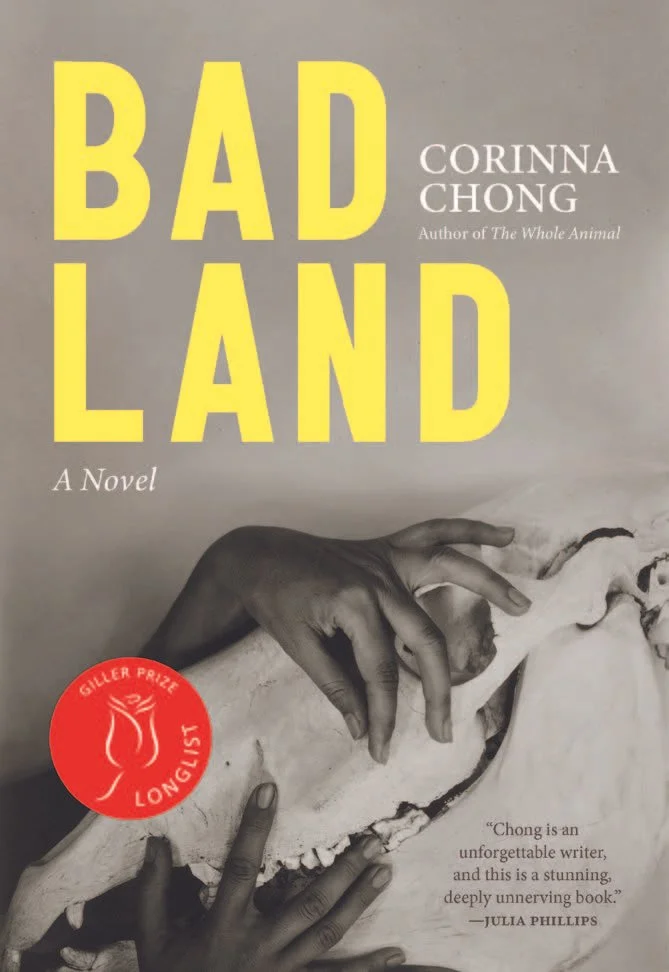Bad Land
Bad Land
By Corinna Chong
Arsenal Pulp Press, 2024; 244 pages; $24.95
Reviewed by Hana Mason
In Corinna Chong’s Bad Land, the reclusive but headstrong Regina lives alone in her mother’s Drumheller home until her solitary life is disrupted by the arrival of her estranged brother, Ricky, and his six-year-old daughter, Jez. There are several mysteries at the core of the story — what has happened to Ricky and Jez? What tragedies led Regina to live the life she’s living, fossilized in her childhood home, abandoned by her mother? What is wrong with Jez, and is it the same thing that is wrong with Regina? The plot — part runaway road trip, part thriller, part family drama — is both fantastical and surprisingly simple.
The misunderstandings and relationships at the centre of the story feel realistic and believable despite themselves, and the resolution is cathartic in its half-complete simplicity. The characters are all unique and well-crafted — you will hate and love them in equal measure. Jez is particularly compelling — Chong crafts the conversations and behaviours of the young girl with deft and entertaining accuracy and imbues her with an adult complexity to match her traumatic experiences. As a one-time Albertan herself, Corinna Chong demonstrates an intimate understanding of the unique, harsh, beautiful landscape of Drumheller and the surrounding badlands — and it is exciting to read a book set in a place in the Canadian landscape not often depicted but so rife with possibility. She utilizes fossilization and palaeontology as a striking metaphor and method of plot development, more than earning Bad Land the label of “prairie gothic.”
Regina is established early on as a plus-sized woman. In a time when prominent authors like Sally Rooney are being criticized for over-representation and romanticization of thinness, it could easily be argued that it’s a strength of the book to include variety in body types and reflect the experience of living in a fat body. However, I found it to be a weakness of the novel.
Regina’s fatness is far from the most compelling thing about her, and though her fatness doesn’t really impact the plot — typically a good thing when it comes to equitable representation — it also doesn’t seem to meaningfully inform her character. Her characteristic impulsiveness, anger, and misplaced selfishness could all exist without this added element of largeness, so it feels disconnected from an accurate or empathetic lived experience. The moments where fatness is described or mentioned verge on the cliché (worry about fitting into seats on public transport), or absurd (the suggestion that “a size twelve [shoe] for woman is too gargantuan to exist in a bowling alley.”).
Part of the preoccupation with fatness is, though, due to a strength of the book — Regina’s staunch lack of self-awareness. The thoughts Regina has about her largeness are just that — internal thoughts — and avoid the harshness of an authorial or even external voice (besides, on occasion, Regina’s mother) commenting on her body and the space it takes up. We are deeply in Regina’s head, and we learn information at the same rate she does — the truth unfolds deliciously and realistically. As Regina questions her memories and, as the book jacket says, “shapes (her) version of the truth to survive,” she does not question herself or her perceptions until she is forced to, making her an incredibly compelling, if unreliable, narrator. She is flawed and contradictory; she is empathetic and frustrating. In her imperfection and heedlessness, her heartfelt empathy and sharp vindictiveness, Regina is truly an original.

